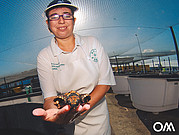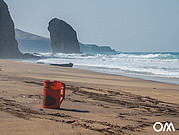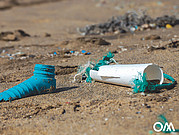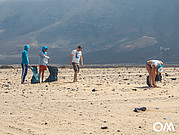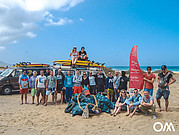OTRO MODO Surfcamp environment protection
The protection of our large blue playground is very important to us. Therefore we supported local environmental protection organizations, for example, the project to resettle the sea turtle on Fuerteventura. In addition, we organize regular beach cleanings with local partners.
Furthermore, we try to raise awareness among our guests in our weekly theory lessons for the protection of the oceans and its inhabitants.
What we do for sustainability & environmental protection:
- Local partners:
We only work with local partners and place great emphasis on fair wages. In this way, we support the inhabitants of our beloved island, secure jobs and strengthen the local economy. - Sustainable neos:
Our wetsuits at the surf school are from Billabong's sustainability line and consist of a large proportion of recycled materials such as PET bottles, car tyres and old rubber. - Renewable energy:
Our beautiful surf villa in La Pared is completely energy self-sufficient. Thanks to the attached solar panels on the roof, we use natural solar energy and produce clean electricity. - Beach Cleans:
We always organise joint beach cleans on the beaches in Fuerteventura. In doing so, we collect large amounts of plastic waste that regularly washes up on the coasts. - Raising awareness:
During our surf courses, we want to raise awareness of how important it is to protect and keep clean our vital oceans and all their inhabitants.
IMPORTANCE OF THE OCEANS FOR OUR PLANET
Everybody loves the ocean. It’s a part of us and it’s the origin of life. Have you ever thought about how important the oceans are for the global climate and how much biodiversity there is under your surfboard?
Our oceans cover over 71% of the total area of planet Earth. That's why we call it the blue planet, and that's certainly how we are regarded by other existences in space.
Water is the origin of all life. Without water, the earth would be an inhospitable place without different species, without oxygen - without water, no life.
For us humans, the sea is the basis of existence. Once a food supplier mainly for the inhabitants of the coastal regions, today all the inhabitants of the earth are supplied with fresh fish and seafood. We use the sea as a transport space and as a supplier of mineral resources - and we relax on the many beautiful beaches of this world.
There are 3 oceans - the Pacific Ocean, which covers 35% of the Earth's surface, the Atlantic Ocean, with a surface area of 21%, and the Indian Ocean, which still accounts for 15% of the total surface area of our planet.
The oceans are of enormous importance for our global climate. As a perfect energy store, water is able to absorb and store a lot of heat. However, the water can also release this heat again, for example through evaporation. This creates an important cycle. The top 2.5 metres of the sea have the greatest storage capacity. All sea surfaces store as much energy as the entire atmosphere that is above the seas.
Besides the warm surface currents, which are driven by the wind, there are also the cold water currents (cold water is heavier than warm water), which move along the seabed.
In this way, a rotating cycle is created: energy is stored on the surface, sinks and continues to move in this way. This cycle has a duration of 1000 years.
Such a large heat reservoir is extremely important for our climate. If we humans contribute to the greenhouse effect because the climate is warming, this also affects our oceans. Since warm water needs more space than cold water, the sea level rises. But that is not all. The climatically very favourable characteristic of the oceans - as heat reservoirs in the upper regions, cold chambers in the lower regions - contributes to the dissolution of large quantities of carbon dioxide, especially in the lower, cooled water layers.
AROUND 90% OF ALL CARBON DIOXIDE DEPOSITS ARE IN OUR OCEANS.
If the oceans continue to warm and the cold-warm mixing can no longer take place sufficiently, the oceans' capacity to absorb carbon dioxide will also weaken.
The cycle of warming of the atmosphere, formation of greenhouse gases, warming of the oceans - which can therefore absorb less carbon dioxide - and thus rising temperatures, is disastrous. This is because the water thus begins to evaporate more and more, and the gases stored in it are also released back into the atmosphere.
The salt composition of the oceans determines the dynamics of the ocean's movements, its currents. Water with a higher salt content freezes in a different way than water with a lower salt content. More salt in the water means: The water freezes much later and becomes dense more quickly, cools down faster and thus sinks earlier.
This also affects the Gulf Stream - Europe's heating system. Warm water from the Caribbean flows past the American coast to Europe and falls again at the coast of Norway due to the high salt content.
Global warming brings with it major problems. If it gets warmer, our glaciers melt more quickly, fresh water mixes with salt water and thus causes an imbalance in the salt balance of the oceans. This could one day have unforeseen consequences for the Gulf Stream. These undeniable facts show us how urgent it is to protect our environment for future generations.
OUR OCEANS: HOME TO THOUSANDS OF ANIMAL SPECIES & PLANTS
However, the ocean does not only play a major role for us earthlings. It is also of immense importance for the countless species that live in our waters.
The Great Barrier Reef alone is home to more different plants and animals than anywhere else on the planet. Sea turtles, dolphins, various species of whales - many of these animals are now considered endangered.
Warming seas are putting the entire Great Barrier Reef at risk, and it is expected to almost completely disintegrate (90%) by the middle of the 21st century.
Most of us will probably not live to see it. But don't we want to preserve this wonderful creation of nature? Aren't we thinking about those who will come after us? What happens to our earth when entire ecosystems die?
RUBBISH BELONGS IN THE BIN, NOT IN THE SEA!
There are already gigantic amounts of waste floating in our oceans, some of which will take 450 years to completely decompose due to their chemical composition. People have been throwing their waste into the water for thousands of years. As long as this consisted only of biological materials that find their way back into the ecosystem with the help of bacteria, UV light and wave action, there was no problem.
But our civilisation waste of today is long-lived. Worldwide, almost 120 million tonnes of plastic are produced every year!
According to Greenpeace and a UN study, there are currently almost 20,000 pieces of plastic floating on every square kilometre of ocean.
Due to meteorological peculiarities, more visible rubbish accumulates on the surface in some places than in others. Between the Hawaiian Islands and the American continent, a high-pressure area creates an ocean vortex that moves the rubbish masses in a clockwise direction. Since the waste in this vortex cannot free itself from this current, it will spend the next 15 years in this vortex.
The result is an almost closed carpet of waste that is now as large as Central Europe.
Sooner or later, every piece of rubbish that is thrown into the North Pacific ends up in this enormous carpet of waste.
However, more and more plastic waste also ends up in our food chain. Toxic substances accumulate on the plastic waste, animals ingest this waste and thus the toxin through their food, and in the end, we are also consuming our own waste. And this in the highest concentration.
It cannot be our goal that we poison ourselves and harm other people with our carelessness.
It is often only a short distance to the nearest rubbish bin. A short moment of bending down to dispose of what we have used and no longer need.
DANGER FOR WILDLIFE
For marine animals, litter poses an additional danger. They suffocate, drown, starve to death, die of thirst and die in agony in our carelessly discarded objects.
Many birds feed plastic parts to their offspring because they cannot distinguish them from their food.
Plastic residues were found in the stomachs of 97% of all fulmars in the North Sea. These can neither be excreted nor utilised, leaving the animals to starve to death.
Sea turtles get tangled in ropes and lines made of plastic, whales and dolphins die and the entire ecosystem suffers.
The amount of rubbish in our oceans has increased alarmingly and it is not decreasing. The negative consequences of this are enormous.
SO WHAT CAN YOU & I DO?
We can all help to protect our common habitat.
As surfers, we move in the oceans for our pleasure. We should treat them with the utmost respect, humility and thoughtfulness.
Nature reserves are not playgrounds and should be respected at all costs!
Avoid litter! Always take a rubbish bag to the beach. Pick up plastic items, also urge other beach users to be careful. Share your knowledge.
A cigarette filter takes 80 years to decompose, aluminium drinks cans don't decompose, plastic takes centuries to decompose.
Never forget that we only have one planet - Protect Your Surf Environment!
